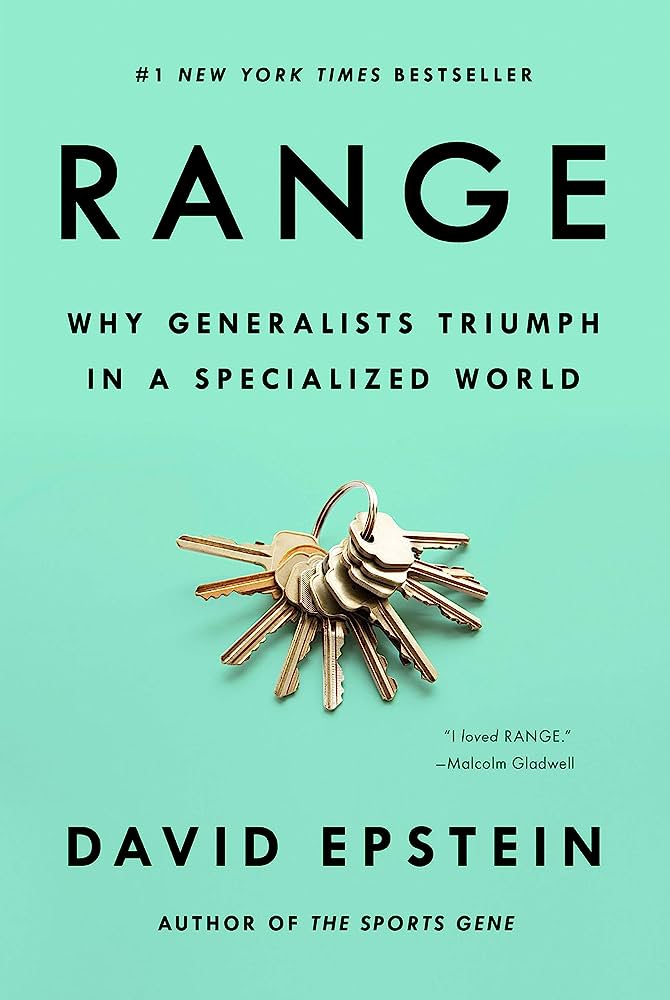Author: David Epstein
Year published: 2019
Fiction/non-fiction: Non-fiction
Number of pages: 272
Cost on Google Books: $14.99
Amazon: 4.8 out of 5 stars
Goodreads: 4.4 out of 5 stars
Google Books: 4.9 out of 5 stars
Chapters List
- The Myth of the Early Start
- The Trouble with Specialization
- The Power of Breadth
- The Value of Delay
- The Importance of Failure
- The Virtues of the Dilettante
- The Generalist Renaissance
- The Future of Generalists
Short summary (without spoilers)
In Range, David Epstein argues that generalists, rather than specialists, are better equipped to succeed in the complex and unpredictable world of the 21st century. Epstein draws on evidence from a wide range of fields, including sports, business, and science, to show that generalists are more creative, adaptable, and resilient than specialists.
Epstein argues that the traditional emphasis on early specialization is misguided. He shows that many of the world’s most successful people, including Steve Jobs, Elon Musk, and Bill Gates, were generalists who experimented across different fields before finding their true calling.
Epstein also argues that the modern world is increasingly demanding generalists. In a world where jobs are constantly changing and new technologies are emerging all the time, it is more important than ever to be able to think broadly and learn new things quickly.
Long Summary (With Spoilers)
In his book Range: Why Generalists Triumph in a Specialized World, David Epstein argues that generalists, rather than specialists, are better equipped to succeed in the complex and unpredictable world of the 21st century.
Epstein begins by debunking the myth of the early start. He shows that many of the world’s most successful people, including Steve Jobs, Elon Musk, and Bill Gates, did not specialize early in their careers. In fact, many of them experimented across different fields before finding their true calling.
Epstein then goes on to explain the advantages of being a generalist. He shows that generalists are more creative, adaptable, and resilient than specialists. They are also better able to see the big picture and to make connections between seemingly unrelated ideas.
Epstein also argues that the modern world is increasingly demanding generalists. In a world where jobs are constantly changing and new technologies are emerging all the time, it is more important than ever to be able to think broadly and learn new things quickly.
Epstein concludes by offering some advice for becoming a more successful generalist. He encourages readers to delay specialization, to embrace failure, and to be curious about a wide range of subjects.
Practical Tips from Range
- Delay specialization. Don’t rush to choose a career path. Instead, take your time to explore different interests and develop a broad range of skills. This will give you more flexibility in the long run.
- Embrace failure. Failure is a necessary part of the learning process. Don’t be afraid to try new things and make mistakes. The more you fail, the more you will learn.
- Be curious. Be open to learning about new things, even if they seem unrelated to your current interests. The more you know, the better equipped you will be to solve complex problems and come up with creative solutions.
- Develop a network of diverse contacts. Surround yourself with people from different backgrounds and disciplines. This will help you to see the world from different perspectives and to learn new things.
- Become a lifelong learner. The world is constantly changing, so it is important to be committed to continuous learning. Read books, take classes, and attend conferences. The more you learn, the more valuable you will be to employers and to the world around you.
Conclusion
Epstein’s book is a powerful argument for the importance of generalism in the 21st century. He provides compelling evidence that generalists are better equipped to succeed in the complex and unpredictable world of today. Epstein’s book also offers some practical advice for becoming a more successful generalist.
If you are interested in learning more about the benefits of generalism and how to become a more successful generalist, I highly recommend reading Range.




